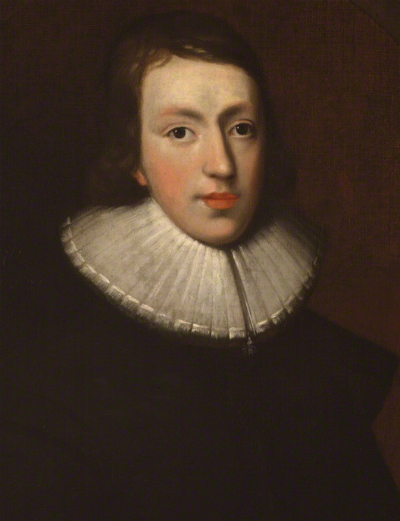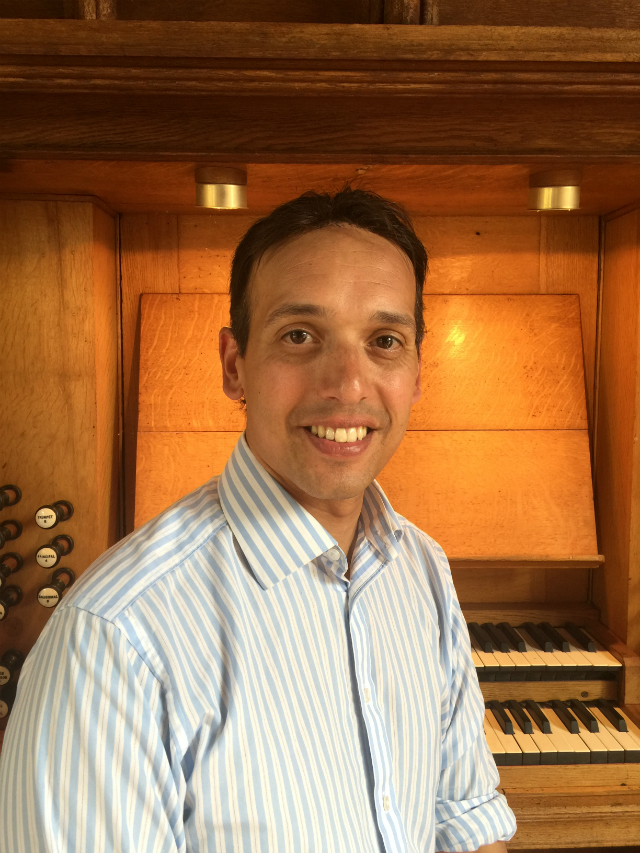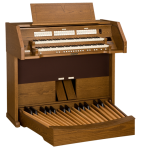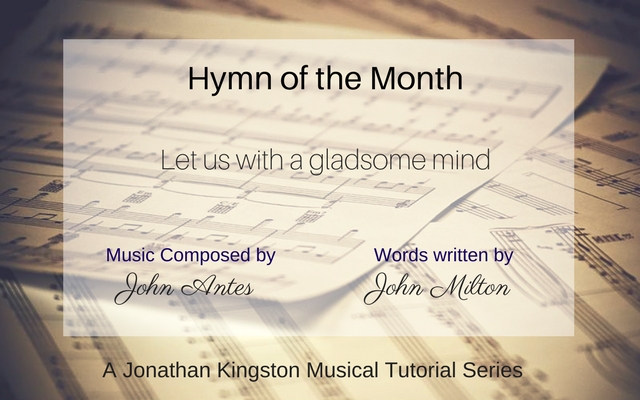The Hymn of the Month this time is “Let us with a gladsome mind” which is a text written in 1623 by John Milton (1608-1674), the famous poet and author of Paradise Lost. This is set to the hymn tune Monkland, by John Antes (1740-1811), a Moravian minister and composer. Monkland’s melodic contour is a great match for the hymn text.
Monkland by Composer John Antes (Adapted by John Wilkes)
The hymn tune Monkland has a fascinating and slightly complex history. It is based on a tune for the text “Fahre fort” in Johann A. Freylinghausen’s hymnal, Geistreiches Gesangbuch (1704). The tune was then altered by John Antes before receiving its present shape at the hands of John Lees in another Moravian hymnal, Hymn Tunes of the United Brethren (1824). John Wilkes then further simplified it and Henry W. Baker, published it in the English Hymns Ancient and Modern. Wilkes titled the tune Monkland after a village in Hertfordshire where he was the organist and Baker was the pastor.
John Antes was a missionary, watchmaker, business manager, and composer. He was born in Frederick, Pennsylvania USA which is near the Moravian community of Bethlehem. He was trained at the Moravian boys’ school before he left Bethlehem in 1764 and travelled to Herrnhut, Germany. This was the international center of the Moravians, where he intended to pursue a career as a missionary. He was ordained in 1769, and spent the next 12 years in Egypt. In 1781, he left for two years in Germany before settling in Fulneck, England. He later retired in Bristol where he also died in 1811.
Antes is well known for his vocal works, the two most famous anthems being “Go, Congregation, Go!” and “Surely He Hath Bourne Our Griefs”. It seems likely that Antes wrote most of his vocal pieces while working at the Fulneck Moravian settlement in England. Among his compositions are a number of anthems, several string trios, and over fifty hymn tunes.
Let us with a gladsome mind by John Milton

John Milton was an English poet, polemicist, and civil servant for the Commonwealth of England under Oliver Cromwell. He is best known for his outstanding poem Paradise Lost (1667), and much has been written about him. However, his influence on English hymn-writing wasn’t as strong as his influence on poetry and other literature. His 19 versions of various Psalms for the most part being unused by hymnal compilers.
Milton based “Let us with a gladsome mind” on Psalm 136. It might come as a surprise to some of you that he wrote the hymn as a fifteen year old schoolboy. It is said that he hadn’t intended to write a hymn, and that his poem was set to music long after Milton’s death. We are certainly grateful for this today.
Watch the video – Let us with gladsome mind
This is played on a custom built Envoy 23-S, which is a very popular church instrument.
About Jonathan Kingston’s Musical Background

Jonathan was an organ student while studying with Ian Tracey and Ian Wells at Liverpool Anglican Cathedral before being appointed Sub Organist at Bradford Cathedral, aged 18. Assistant Director and Director of Music appointments followed at Stowe and Bromsgrove Schools before an appointment to The King’s School in Ely where he served Ely Cathedral as a deputy organist.
Jonathan is a recording artist for Naxos, Priory and EMI Records and is an ABRSM examiner and coordinator touring the UK and internationally. As an organist, he has appeared with many leading orchestras and choirs including the Royal Liverpool Philharmonic, Halle, London Symphony Orchestra & Chorus and English Symphony Orchestra as well as featuring in many live broadcasts on BBC radio and television.
He is the newly appointed Director of Music at Stony Stratford Parish Church where he presides over the magnificent Willis pipe organ.
Jonathan’s Work With Viscount
Jonathan’s work with Viscount Classical Organs encompasses performing and presenting promotional and tutorial material for the company and his freelance portfolio covers educational outreach, teaching, performing, examining and musical direction. He covers several areas for Viscount from sales, demonstrations, voicing of instruments and performing. His playing features on the current promotional DVD material for Viscount, and he would be very pleased to hear from any churches or individuals requiring an engaging and lively recitalist. If you would like to connect with Jonathan directly, please feel free to follow him on Twitter (@jonkingston) or by email on jonkingston@hotmail.co.uk.
About the Digital Organ Being Played

Jonathan plays this piece on an instrument based on our Envoy 23-S. A ‘Physical Modelling’ based instrument with 23 stops in a real wood veneer cabinet. It has a huge internal library allowing the user to create 4 totally individual voice pallets from classic English through Baroque and Romantic. It benefits from a full complement of divisional thumb pistons and additional toe pistons. The standard 23-S organ has a 30 note pedal board while the instrument in the film has a 32 note board. For more information have a look at the specifications here.
I have had a passion for church organs since the tender age of 12. I own and run Viscount Organs with a close attention to the detail that musicians appreciate; and a clear understanding of the benefits of digital technology and keeping to the traditional and emotional elements of organ playing.



